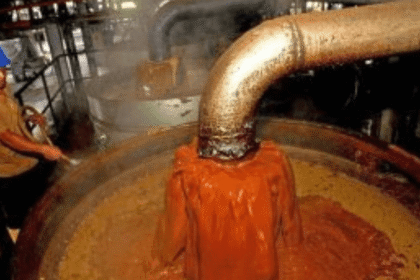Palm oil’s fall and Nigeria’s opportunity: From lost dominion to value-creation rebirth

In the industrial hubs of southern Nigeria, palm oil barrels are traded like high-stakes commodities. In one particularly vivid recounting, agribusiness expert John Dale, co-founder of StorGit, described exactly how lucrative this is:
“A barrel of palm oil is now more expensive than a barrel of crude oil. We make 75–120% on average in palm oil arbitrage trade.”
He recalls loading ₦700 million worth of palm oil into trucks every two weeks, bound for Niger, Chad, Cameroon, and Mali. The oil leaves in full kegs, the drums return empty, ready to repeat the cycle.
Behind that profitable logistics loop is a painful irony: Nigeria, a former world leader in palm oil, is now import-dependent. We export a few barrels and import far too many.
From Global Giant to Importer – The Numbers Speak
Once, Nigeria accounted for over 40% of the world’s palm oil production. By the 1970s, countries like Malaysia and Indonesia had taken over. Now, Nigeria ranks fifth globally, with just 1.5 million tonnes produced in 2023–24, a shadow of its former dominance.
Imports have surged. While popular reports estimate Nigeria brings in $235 million from Malaysia, $92.7 million from India, and $68 million from Indonesia, actual data from 2023 shows Nigeria imported approximately $183 million worth of palm oil, with over 90% sourced from Malaysia, and smaller shares from Cote d’Ivoire, Indonesia, and China.
These figures reflect a staggering national opportunity cost:
3.1 million hectares of oil palms lie abandoned – a lost asset valued at over ₦11 trillion (about $9.5 billion).
Indonesia, by comparison, harvests nearly $23 billion in palm oil exports annually.
Nigeria loses more each year through this abandonment than its entire agricultural budget over the past decade.
Why Palm Oil Matters More Than Ever
Palm oil is not just a food staple; it is raw economic sovereignty in liquid form. Unlike crude oil, palm oil regenerates. It cultivates food, fuels economies, and sustains livelihoods across generations. John Dale’s likely lament echoes:
“If Nigeria treated palm oil as seriously as crude oil, these lands would be alive again with palm estates and modern processing hubs… We once held 60% of the world’s share. We lost an industry we once dominated, quietly, without a fight.”
The Pattern Across Africa
Palm oil is just one of many stories where Africa’s cash crops, from groundnut to shea butter, are seemingly abandoned to others. Nigeria used to lead in groundnuts; Ghana in cocoa; and Kaduna in cotton. Today, we sell the raw materials, while others reap the value-added rewards.
Shea butter, pressed by African women, is packaged and branded abroad. Ginger’s essence lives in others’ spice blends. Unless we reclaim these value chains, billions will continue slipping from our grasp.
A Path Forward – Strategic Reindustrialisation
Fortunately, momentum for revival is emerging.
Replanting ambition: The Oil Palm Growers Association of Nigeria (OPGAN) aims to replant 1.5 million hectares over the next five years, targeting a leap from fifth to third in global production rankings.
Backward integration: Major players like Okomu, Presco, and PZ Wilmar are investing in processing and expanding plantations, undercutting imports while scaling local production.
Strong value propositions: Companies like Okomu Oil recorded ₦75 billion in revenue and ₦33.8 billion pre-tax profit in 2023, showcasing the profitability of capturing in-country value.
Why This Moment Matters
Consumer demand is soaring – not just at home but across the Sahel and West African markets.
Imported palm oil costs more than locally produced, prepackaged, traceable oil could, if scaled properly.
A restoration of the oil palm industry would echo through rural livelihoods, industrial growth, and the strength of the naira.
This is not nostalgia, it’s strategic economics. Farming palm oil brings continuous harvests, rural jobs, and perpetual revenue. It’s an agrarian futures market that pays back and regenerates. As John Dale implores:
“Don’t wait for government, grants, or subsidies. Reclaim abandoned lands. Replant dead hectares. Build estates, processing plants, and packaging hubs. Crude oil runs out. Palm oil renews.”
Reclaim, Replant, Reindustrialise
Nigeria stands at a crossroads. We can remain a net importer of a crop we once defined, or we can transform palm oil into a national asset, one that feeds our people, empowers our industries, and keeps value at home.
It is time to rewrite the story. The lands are there. The capital can be marshalled. The markets, internal and regional, are waiting. The time is now. And this is not just about palm oil. It is about Nigeria’s ability to make, own, and dominate again.




You must be logged in to post a comment.